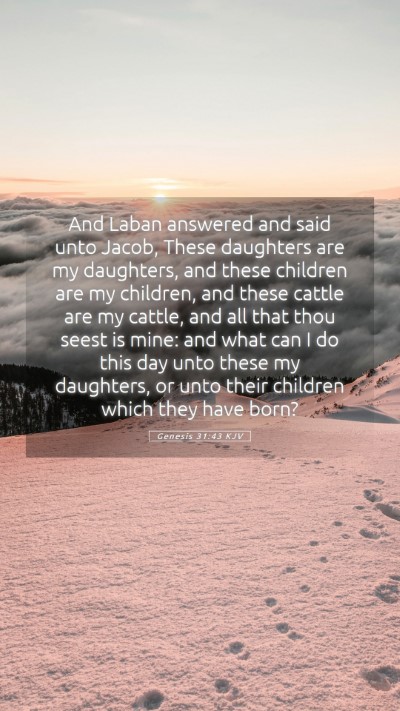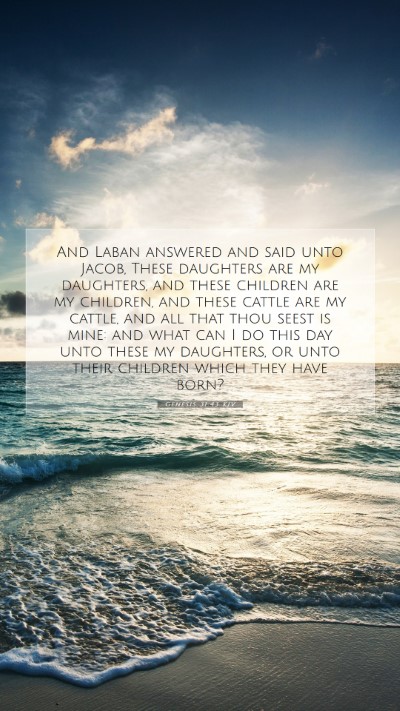Understanding Genesis 31:43
Genesis 31:43 states:
"And Laban answered and said unto Jacob, These daughters are my daughters, and these children are my children, and these cattle are my cattle, and all that thou seest is mine: and what can I do this day unto these my daughters, or unto their children which they have born?"
Overview of the Verse
This verse forms part of a larger narrative involving Jacob and Laban. It captures Laban's response during a tense exchange between the two men regarding ownership and familial ties. Understanding this verse requires insights into its historical and cultural context within the scripture.
Bible Verse Meanings
1. Familial Relationships: Laban emphasizes the familial connection he has with Rachel and Leah, highlighting that they are his daughters. This goes to show how important family ties were in that era.
2. Ownership and Possession: The statement "all that thou seest is mine" reveals Laban's claim over the wealth and livestock that were previously considered Jacob's possessions due to his labor and dedication to the family business.
Bible Verse Interpretations
This verse is interpreted in various ways:
- Matthew Henry: His commentary reflects on the jealousy of Laban, who is unwilling to concede to Jacob, despite Jacob’s substantial contribution to his wealth. Laban's possessiveness borders on greed as he fails to recognize the blessings Jacob brought to his household.
- Albert Barnes: He points out that Laban’s claim symbolizes the struggle of Jacob to assert his independence and the challenges faced when breaking away from his past. Laban represents the old life Jacob had to leave behind.
- Adam Clarke: Clarke notes that this confrontation illustrates a significant moment of tension in the unfolding story of Jacob, representing not just a physical separation but a spiritual and emotional divide from a manipulative figure in his life.
Bible Verse Understanding
Understanding this verse involves examining the deeper implications of Laban’s words:
- Context of Generational Conflict: The verse serves as a contrast between Jacob's evolving identity and Laban's lingering hold over him as a father-in-law.
- Emotional Weight: Laban’s assertion carries emotional weight, illustrating a man desperate to cling to his control despite the inevitability of separation and change.
- Reflection on God’s Promises: In the larger context of Genesis, this moment is pivotal as it sets the stage for Jacob’s journey to fulfill God’s promises written in earlier chapters.
Bible Verse Explanations
The explanations surrounding this verse enrich our understanding of the human emotions involved:
- Struggle for Identity: Jacob struggles with his identity while stepping away from Laban’s shadow, highlighting the broader themes of self-discovery and personal growth.
- Testing Faith and Loyalty: Laban’s words challenge Jacob’s faith, forcing him to consider his loyalty to his family vs. the call he has to honor God’s leading in his life.
Bible Commentary and Insights
This verse has sparked discussion in Bible study groups and online forums:
- Many believers reference this narrative when discussing issues of loyalty, faithfulness, and the importance of breaking free from toxic relationships.
- It serves as a study topic for exploring how individuals may need to navigate complicated family dynamics while seeking to fulfill divine purposes.
Related Bible Cross References
- Genesis 29:25 - Jacob’s hard labor for Laban’s daughters.
- Genesis 30:25-43 - Jacob’s dealings and growing wealth.
- Genesis 32:1-2 - Jacob’s journey back and encounter with angels, marking a pivotal transformation.
Conclusion
This exploration of Genesis 31:43 provides readers with a deeper understanding of the complexities involved in familial relationships and personal identity within the biblical narrative. Through commentaries and interpretations, we glean valuable lessons on ownership, loyalty, and the unfolding of God’s plans in our lives.
Bible Study Tools and Resources
For anyone interested in further studying scripture, consider utilizing various Bible study tools such as:
- Bible Study Guides: Aid in conducting personal or group studies.
- Online Bible Study: Platforms that facilitate remote discussions and teachings.
- Bible Study Resources: Materials like commentaries and historical analyses to deepen understanding.


